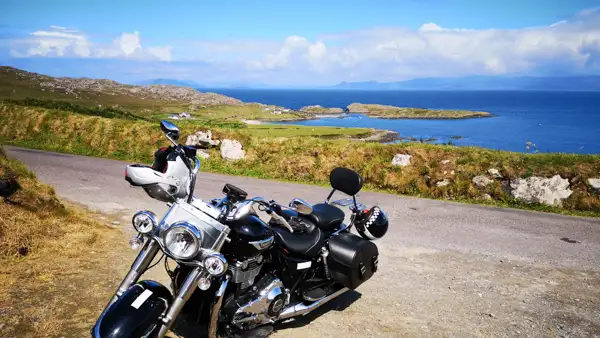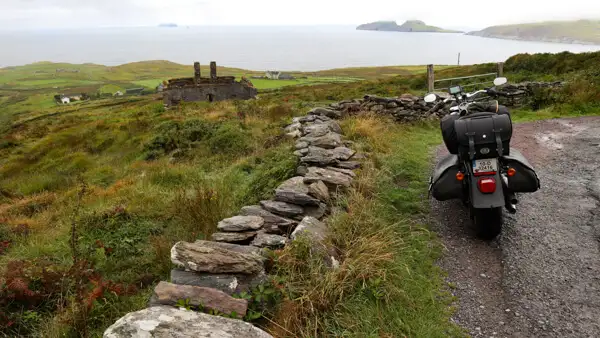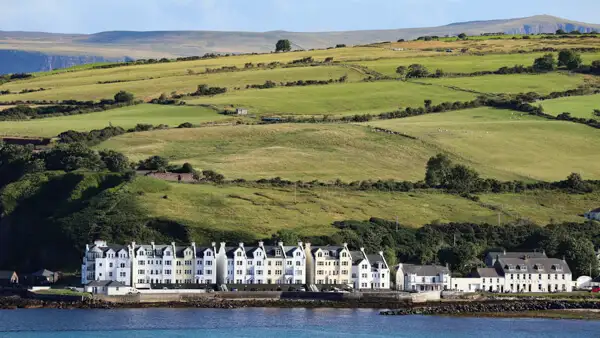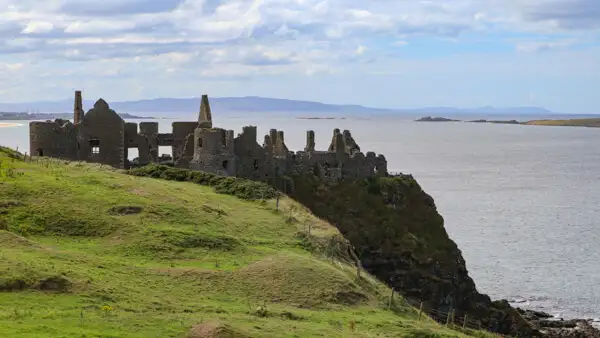The best accident is the one you could have avoided! But how do I avoid an accident on a motorbike trip?
Page Contents (click line to jump the text)

Intro
If your motorbike is well maintained and the tyres still have good tread, then you have already done a lot right.
If the bike fits you well and you can handle it well – all the better. A motorbike that demands a lot of concentration from you becomes a problem when travelling – smaller and lighter is usually easier to control than too big, too heavy and with too aggressive an engine.
Clothing that is too warm, too cold or too wet, an unsuitable helmet or a suit that is too tight will affect your concentration considerably. Conversely, if everything fits and suits the climate, you have done even more right. If your helmet and clothing are visible to other road users, all the better.
Lack of sleep, dehydration and hypoglycaemia are other significant risk factors – plan your overnight stays well and take enough breaks.
Speaking of travel planning – prepare for your destination country so you know what to expect. On the small narrow and often bad country roads in Ireland, 250km a day is a full day. Many motorcyclists ride less than that. If you take on too much distance, it stresses you out – is that good for your concentration or your riding? It’s clear, isn’t it?
Let’s move on to the driving behaviour: A journey is not a home round, or a sprint, but a marathon. Forget about leaning and keep your distance from the centre line (where the tractor will meet you). Ride steadily and with foresight, then you will have time to consciously enjoy the wonderful landscape. Keep to the speed limits, drive considerately and remember that a child or a dog can jump out from around every corner.
But despite all your caution, it can still happen – an accident. What now? This is what the following is all about.
Disclaimer/exclusion of liability: I have done many motorbike tours and run a motorbike rental business in Ireland (update: no more…).
However, I am neither an expert in traffic law nor an emergency doctor. My statements are therefore only my own experiences, not legally binding information.
Secure the accident site
If you are involved in a fresh accident, you should help to secure the scene of the accident so that nothing else happens. If you park a short distance behind the vehicle and switch on your hazard lights, this will already help a lot with visibility.
Placing a warning triangle or a warning waistcoat in a clearly visible position is also helpful, and wearing a warning waistcoat helps yourself. You shouldn’t endanger yourself in the process.
Are you the victim of the accident? Can you move away from the danger zone? Behind the crash barrier, for example? Can you use hand signals to stop other vehicles to get help? Can you reach your smartphone to make an emergency call?
Are there several helpers at hand? Wonderful, then coordinate, one secures, one calls 911 and one takes care of the accident victim(s). If no one takes the lead, you do it, many people are basically willing to help but are just unsure.

Making an emergency call: Emergency numbers, and automatic systems
The emergency numbers in Ireland are 112 and 999. In Northern Ireland, the emergency number is 999. Check the position on your sat nav or smartphone and say what happened, where it happened, is anyone injured, what do you need?
In modern BMWs, there are automatic emergency call systems that automatically trigger an emergency call in the event of an accident. In this case, you make a phone call via satellite connection directly to a member of staff at the emergency call centre, who can initiate the rescue chain for you. If you are unconscious, he will do the same. If someone else has had an accident, you can also trigger the motorbike emergency call manually.
There are other systems that offer similar functions, e.g. apps for smartphones. These trigger an emergency call for you in the event of strong vibrations, bangs or other indicators. Apple offers such a function for newer iPhones.
Maybe you would like to get such a system?
First aid kit and safety waistcoat – and then?
In France, the high-visibility waistcoat is compulsory, but no matter where, it makes sense to have one with you. Also a first aid kit.
Is the injured person breathing and does he have a pulse?
Is there bleeding or other serious injuries?
Is there shock, or is the injured person lucid and responsive?
You will get the exact questions and answers in your 1st aid refresher course.
Are you injured yourself? Check your condition, call for help and get specific help (e.g. stop bleeding).
Document the accident and make a police report
If you are not injured, you can take some photos until the police arrive, or ask someone else to take some photos with your mobile phone.
Your vehicle, the other vehicle and a few overview pictures showing the situation. This will help you to describe the accident to the police and your insurance company.

Do not blame or admit fault, just try to be as accurate as possible in your account of what happened.
The police, in Ireland they are called Garda, will ask for your identity card or passport and proof of insurance. This may be your green insurance card (it is now white).
Of course, if you have a German vehicle, you should also have a vehicle registration document, but there is no such thing in Ireland, so probably no one will ask for it.
Health and Accident Insurance in Ireland
Emergency services or hospital staff will ask if you have health insurance. By this they mean Irish health insurance. Sometimes they will take your German (or other) health insurance card and bill you with it, but more likely you will have to pay for the services yourself first and then you will get a receipt that you can later submit to your health insurance company for reimbursement.
Extra cover: travel and recovery insurance abroad
A cover letter, e.g. from the ADAC (in Germany), offers you additional insurance benefits and telephone support that can help you solve problems, such as the transport of the broken motorbike or the return transport of the patient to Germany.
What to do with the motorbike that has been involved in an accident?
The police will also call a breakdown service, which usually takes the motorbike to the nearest garage. If it has to be a special motorbike dealer, you can arrange this with the breakdown service. However, you may have to pay part of the transport costs yourself – check your motorbike insurance.

Critical medication and health factors
If you need critical medication, take it daily, or have any health risk factors, you should tell the ambulance staff immediately and the hospital doctor later. You can also keep a list of your daily medications with you or on your smartphone, because under stress you may not remember the name…
Is it better to travel alone or in a group?
Yes, of course better in a group, then you can help each other!
That’s right – but only if the group works well!
I’ve seen groups where everyone was speeding along and no one paid attention to the others. And there are supposed to be groups where a rider has gone missing without them even noticing it….
If your group stresses you out because you always have to drive faster than you normally would, then you drive more unsafely.
And if the group dynamic gets on your nerves after a few days, then the anger can also affect your concentration. Many accidents happen because group members crash into each other.
In all these cases, you’re probably safer riding alone.
But if you have a group where everyone looks out for each other, helps each other and is considerate of each other – then you are in good hands and in case of an accident you have good friends with you who will help you.
With this in mind, I wish you and your friends a wonderful and accident-free motorbike trip!.
More interesting articles for you
PREPARING YOUR MOTORBIKE FOR YOUR TRIP TO IRELAND – WELL PREPARED AND SAFE ON THE ROAD!
LEFT-HAND TRAFFIC – WHAT SHOULD I KNOW AS A MOTORCYCLIST?
HOW CAN I PREPARE MYSELF AS A RIDER FOR THE IRELAND MOTORBIKE TRIP?
MOTORBIKE BREAKDOWN ON THE IRLAND TRIP – WHAT TO DO?
Photo credits cover photo: Ulrich Knüppel-Gertberg (www.irland-insider.de, www.ireland-insider.com)